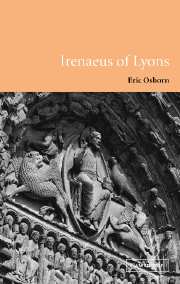Book contents
- Frontmatter
- Contents
- Preface
- List of abbreviations
- Chapter 1 Irenaeus: argument and imagery
- Part I DIVINE INTELLECT
- Part II ECONOMY
- Part III RECAPITULATION
- Part IV PARTICIPATION
- Chapter 7 Logic and the rule of truth: participation in truth
- Chapter 8 Scripture as mind and will of God: participation in truth
- Chapter 9 Aesthetics: participation in beauty
- Chapter 10 Human growth from creation to resurrection: participation in life
- Chapter 11 Goodness and truth: ethics of participation
- Part V CONCLUSION
- Appendix: Gnosticism
- Select bibliography
- Citations from Irenaeus
- Citations from the bible
- Index of classical authors
- Index of patristic authors
- General index
Chapter 11 - Goodness and truth: ethics of participation
Published online by Cambridge University Press: 22 September 2009
- Frontmatter
- Contents
- Preface
- List of abbreviations
- Chapter 1 Irenaeus: argument and imagery
- Part I DIVINE INTELLECT
- Part II ECONOMY
- Part III RECAPITULATION
- Part IV PARTICIPATION
- Chapter 7 Logic and the rule of truth: participation in truth
- Chapter 8 Scripture as mind and will of God: participation in truth
- Chapter 9 Aesthetics: participation in beauty
- Chapter 10 Human growth from creation to resurrection: participation in life
- Chapter 11 Goodness and truth: ethics of participation
- Part V CONCLUSION
- Appendix: Gnosticism
- Select bibliography
- Citations from Irenaeus
- Citations from the bible
- Index of classical authors
- Index of patristic authors
- General index
Summary
Irenaeus begins with a robust ethic of self-determination, an athletic contest for the eternal crown, with prolonged negative provision for losers. Freedom, he knows, is less straightforward because man's range of choices is limited by many factors. Adam fell captive to sin and only after many divine moves did he become free in Christ. Love unites with a passion for truth, affirms the values of natural law and rejects the lusts of the flesh which have no place in God's kingdom. Within a martyr church, Irenaeus finds perfection in the martyr who reproduces the perfect action of Christ. A long-standing objection to Irenaeus (that perfection in Christ removes ethics) is examined. Finally, the highest good is known as truth in the love of enemies.
FREE WILL AND FREEDOM
Irenaeus insists upon the self-determining choice of every human person. All are free to choose or to reject. The same insistence is found earlier in Justin and Theophilus. Irenaeus, like Clement, joins Plato on the responsibility of the individual, and moves from free will to that perfect free obedience where God's goodness is possessed and preserved (4.12–16; 4.37–9).
Irenaeus' account of freedom is expressed most succinctly in four chapters (4.37–40). He begins from ‘the ancient law of liberty’ which God granted to man, that man from the beginning should have his own power of choice. He is able to follow God's good counsel without compulsion. God does not use violence.
- Type
- Chapter
- Information
- Irenaeus of Lyons , pp. 232 - 248Publisher: Cambridge University PressPrint publication year: 2001

